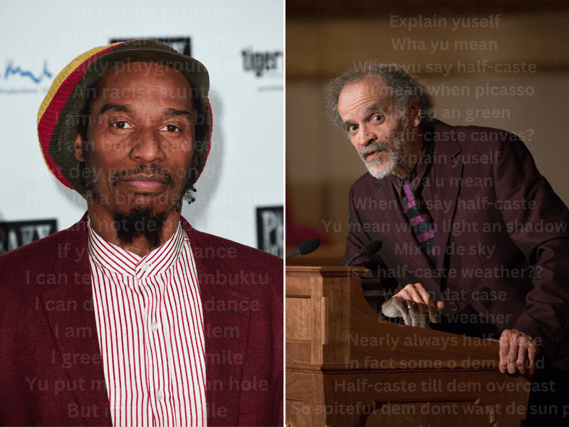The poetic legacy of Benjamin Zephaniah, including his work exploring racial inequality, “No Problem”


Though the world may have lost a literary great in Benjamin Zephaniah, whose death was announced by his family earlier today after being diagnosed with a brain tumour eight months ago, we thankfully have a legacy of his work we can still pour through. Through his children's books and appearances on “Peaky Blinders,” there is always going to be an everlasting legacy regarding the late poet.
It is poetry though where Benjamin Zephaniah made his name; works that delved into the complicated nature of social and political issues, particularly centred around race and identity. Those themes have been prominent in various collections, such as "The Dread Affair: Collected Poems" (1985), showcasing Zephaniah's early works and distinctive style. "Rasta Time in Palestine" (1990) delves into themes of race, identity, and social justice, drawing on the poet's experiences as a Rastafarian and his commitment to activism.
Advertisement
Hide AdAdvertisement
Hide Ad"City Psalms" (1992) reflects on the challenges of urban life, including issues like crime, poverty, and inequality. Zephaniah's humour and wit shine in "Talking Turkeys and Other Poems" (1994), a collection addressing a diverse range of subjects from politics to personal reflections. "Too Black, Too Strong" (2001) continues the exploration of race, identity, and cultural heritage, challenging stereotypes and celebrating diversity.
In "Wicked World!" (2000), Zephaniah addresses global issues like war, injustice, and environmental concerns, reflecting a profound concern for the world's state and a desire for positive change. The more recent "We Are Britain!" (2019) celebrates the diversity of contemporary Britain and engages with issues of immigration, multiculturalism, and national identity.
But it is perhaps his poem, “No Problem”, that has become one of his defining works - so much so that at one stage it became part of the national curriculum. But what are the words to “No Problem” and why does it often get compared to another poem that discusses race: John Agard’s 2005 piece, “Half-Caste?”
What are the words to Benjamin Zepaniah’s poem, “No Problem”
Benjamin Zephaniah - "No Problem"I am not de problem
But I bear de brunt
Of the silly playground taunts
An racist stunts,
I am not de problem
I am born academic
But dey got me on de run
Now im a branded athletic
I am not de problem
If yu give I a chance
I can teach yu of Timbuktu
I can do more dan dance
I am not de problem
I greet yu wid a smile
Yu put me in a pigeon hole
But i am versatile
These conditions may affect me
As I get older,
An I am positively sure
I have no chips on my shoulders,
Black is not de problem
Mother country get it right
An juss fe de record,
Sum of me best friends are white.
What is the link between “No Problem” and John Agar’s “Half-Caste”
More often than not, Zephaniah’s poem draws parallels to that of John Agard’s piece “Half-Caste”. Both poems explore racial identity and the challenges individuals face when they are stereotyped based on their ethnicity. The speakers in both poems question the validity of being labelled or categorized in a way that doesn't capture the full richness of one's identity.
Advertisement
Hide AdAdvertisement
Hide AdIn Benjamin Zephaniah's poem, the speaker challenges the stereotypes imposed on them, emphasizing that they are not the problem but often bear the brunt of prejudice and discriminatory behaviour. The speaker asserts their academic abilities, challenges racial profiling, and highlights their versatility beyond narrow expectations.
Similarly, John Agard's "Half-Caste" confronts the term, questioning its validity and drawing attention to how the concept of mixing different elements is viewed negatively. Agard uses examples from art, weather, and music to challenge the idea that combining different aspects is somehow inferior. The poem is a critique of the term itself and the assumptions it carries.
Both poems engage with the theme of race relations, challenging stereotypes and questioning the language and terms used to describe people of mixed heritage. They highlight the need for understanding and breaking down stereotypes based on race.
Where can I read more of Benjamin Zephaniah’s poetry online?
Several works by the late Benjamin Zephaniah, from his autobiography and poetry to some of his children’s books, are available to read online through Google Books.
Comment Guidelines
National World encourages reader discussion on our stories. User feedback, insights and back-and-forth exchanges add a rich layer of context to reporting. Please review our Community Guidelines before commenting.
